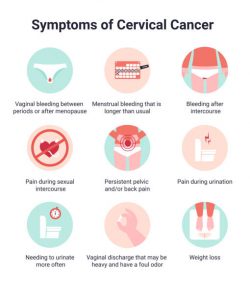
Did you know the cervical cancer death rate among women has been reduced by 50% over the last four decades because of HPV vaccinations and pap testing? And yet, nearly 13,000 cervical cancer diagnoses and 4,200 cervical cancer-related deaths were reported in 2017 alone.
Symptoms of Cervical Cancer
The human papillomavirus (HPV) is the primary cause of cervical cancer in women. However, most women with high-risk HPV infections don’t even realize they have HPV infections unless they progress into something worse, like cervical cancer.
An HPV-infected woman’s risk of getting cervical cancer increases further by smoking, using certain contraceptives, having sex with multiple partners, having several children, transplanting an organ, contracting HIV, or having a previous history of sexually transmitted infections.
Sadly, most HPV-infected women wait until they experience symptoms before seeking testing and treatment for cervical cancer from their gynecologists and primary care physicians.
Cervical cancer symptoms may include the following:
1) Unusual Vaginal Bleeding
One of the most common symptoms of cervical cancer is vaginal bleeding. However, many women will disregard this symptom and relate it to their menstruation cycles. But if bleeding happens between your normal periods, something unusual is happening which must be checked out by a doctor.
You may also experience longer menstrual periods, heavier menstrual periods, bleeding after menopause, bleeding after having sexual intercourse or bleeding after getting a pelvic examination.
2) Foul-Smelling Vaginal Discharge
Cervical cancer denies oxygen to cervical cells, causing some to die and infect the cancerous tumor growing in the cervix.
As a result, the infection produces vaginal discharge with a terrible odor. The discharge will usually appear watery, pale, bloody, or brown. All these appearances are signs of cancer.
3) Painful Sex
You may have an advanced stage of cervical cancer if sexual intercourse feels painful. It is a sign of the cancerous tumor growing into the reproductive organs and tissues in the genital region.
4) Pain in the Pelvis or Lower Back
Any issues with your cervix or other reproductive organs will cause you to feel consistent pelvic pain or lower back pain. A sign of an advanced stage of cervical cancer is if you experience pelvic pain close to your appendix.
Hopefully, you will go to the doctor for treatment before the pain progresses this far.
5) Pain in the Legs
Untreated cervical cancer will continue growing until it puts pressure on the nerves of the pelvic wall. Once that happens, you will experience swelling and pain in one or both legs. Swelling may be attributed to another medical problem, but swelling and pain together usually indicate cervical cancer.
6) Unusual Weight Loss
Women with cervical cancer may notice unusual weight loss, whether they still have an appetite for food or not. So if you lose your appetite or consume lots of food and still experience weight loss, it may be a sign of cervical cancer.
Get Tested for HPV
Get a pap test as directed by your doctor. Pap tests can detect precancerous symptoms and abnormal cervical cell growth before it gets out of hand.
If the doctor determines you have a high-risk HPV infection, they may want to perform a colposcopy to extract and examine a sample of your cervical cells. Based on these results, treatments can be administered to slow precancerous or cancerous cell growth.
Best Cervical Cancer Preventative Measures
Preventing cervical cancer should be your top priority. There have been numerous studies showing that a strong immune system supported with a healthy diet, plenty of sleep, exercise and taking nutrient rich HPV supplements such as AHCC can help fight off infections in the body. If you do not have HPV or cervical cancer, you may still have time to get your HPV vaccination for protection against high-risk HPV types 16 and 18.
In addition, always practice safe sex by wearing protection and reducing your number of sexual partners. Avoid smoking as well.







